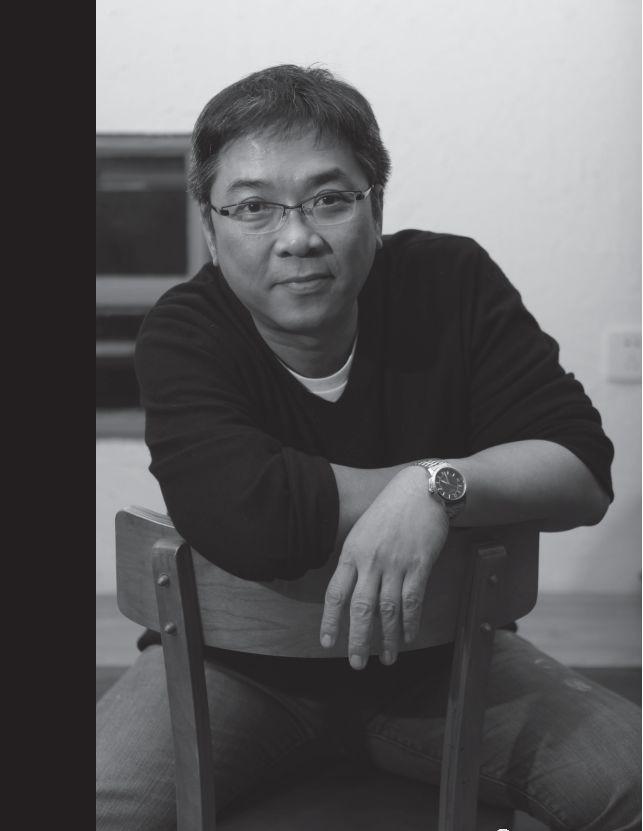Excerpted from the fifth series of the "Youth Film Handbook": "Guan Jinpeng: Near and Far, Far and Near"
Interlocutor / Guan Jinpeng Cheng Qingsong
Photography / Miao Jian Ling Daijun

Cheng Qingsong: It's a pleasure to chat with Ah Guan. In my childhood, Hong Kong movies were very mysterious to me, and when I saw Hui Anhua, Wong Kar-wai and your works later, they were very charming.
Kwan Kam Peng: I believe that the tradition of Hong Kong cinema is originally inherited from the commercial orientation of the industrial environment, which has a lot to do with the environment, for example, since the 1950s and 1960s, the movies we watched when we were children basically paid attention to packaging, and there were many big actors and big stars. So I think take the Hong Kong New Wave as an example, their first film does not necessarily use non-professional actors, not quite like Taiwan's new films, adhere to the local temperament, must use non-professional actors.
Cheng Qingsong: At the end of the 1970s, a large number of Hong Kong films were released on the mainland, such as "Painted Skin", which were all participated by stars. I remember Xia Meng and Chen Sisi, who hadn't seen Shaw's films yet.
Guan Jinpeng: From the film industry to the New Wave, we have never rejected the use of big actors, and big actors are sometimes willing to cooperate with new directors.
Cheng Qingsong: "Rouge Buckle" is basically a big star.
Guan Jinpeng: Even qiu Shuzhen, I think she was a big star at that time.
Cheng Qingsong: "Ruan Lingyu" is a mixture of drama and documentary, but also through the modern Maggie Cheung, through yourself and a few actors to interpret the stars of the 1930s. I feel that Hong Kong movies have always had commercial packaging, but at the same time you have a very big self-consciousness in the language of the film, there has been a lot of exploration, everyone says that the biggest problem of the current movie is to put the stars into it, just find a story, your film has always had its own pursuit in terms of narrative.
Kwan Kam Peng: When I was a child, I liked to watch movies, and as I mentioned just now, when I was a child, my family lived next to a big theater and often watched Shaw's martial arts movies and song and dance movies, so I grew up in the atmosphere of Hong Kong movies. I believe that it should not be more and no less infected by this atmosphere, but after studying science for five years from the first to the fifth grade, suddenly a summer vacation changed, from pure science to pure liberal arts, which may be the reason for the drama of the Red and Blue Drama Society (the Red and Blue Drama Club is a very famous drama club among students). As for the pursuit of film language that you just mentioned, I really feel that in the late 1970s and early 1980s, there was no such self-realization. Whether it is shooting a wireless TV series or following director Xu Anhua out to make a movie, if I am an assistant director of a long-form TV series, I am not good at this way. I was influenced by Hong Kong New Wave directors.
To say that Xu Anhua can't learn, tan jiaming can't learn, but their attitude and persistence to movies will definitely have some impact on me, but I can't just say that the demand for movies, this is also related to my sexual orientation, and the family environment I grew up in, and even related to the big family environment I lived in when I was a child (my aunt is the second landlord, my parents live in a small room, and the family lives in it). I think it also has something to do with school education: the Peizheng school I went to was very good, and there was also a moral education class. I am the eldest, my younger siblings are not blessed by me, I can be arranged to study in a very good school, only a few secondary schools in Hong Kong have moral education, two classes a week, which is related to the fact that it is a Christian school, and I was a devout Christian in middle school. Now I don't feel like I have any particular religious beliefs myself, and I believe it has to do with my own upbringing and every aspect, including sexual orientation. Why I was very open to facing (homosexual status) by 1996, I think there may be many reasons, rather than being influenced by Xu Anhua alone, there may be her influence, but she may be just one of them.
Cheng Qingsong: Your film temperament style has something to do with the general environment when you studied this profession and with these teachers, including your personal sexual orientation, but we often say that your film is still different from other commercial films in Hong Kong, and it is self-contained. Maybe because you are this style, this kind of pursuit, everyone can accept it. If you want to say it in some other way, it may not necessarily be your sign. From the first step you start to the next step, no matter how you shoot, everyone can accept it. Will there be such a process? If you start to come up with something different from others, maybe others don't necessarily like it.
Guan Jinpeng: I believe in me as a person, don't look at my appearance as a warm and gentle person, but I have a stubbornness in my heart. Why I chose "Woman's Heart" and "Underground Love" is because I am easily touched by the life experiences of friends around me, especially female friends, even if I only came out in 1996, but at that time I knew that I was a comrade.